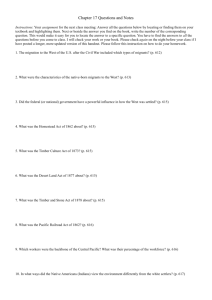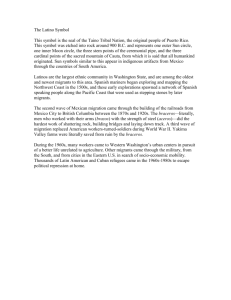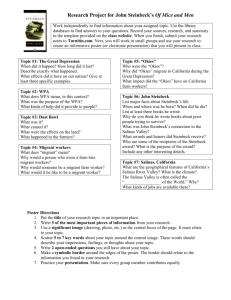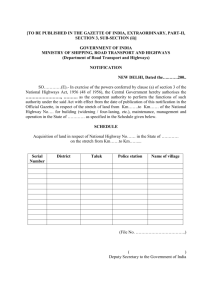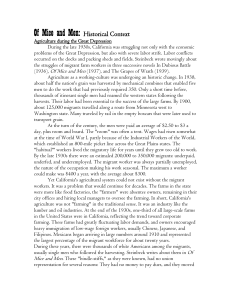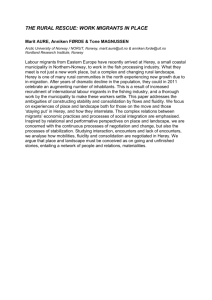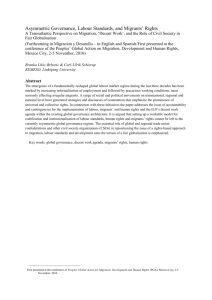Page 1 , Grapes of Wrath, The - John Steinbeck - CVHS-English-2
advertisement
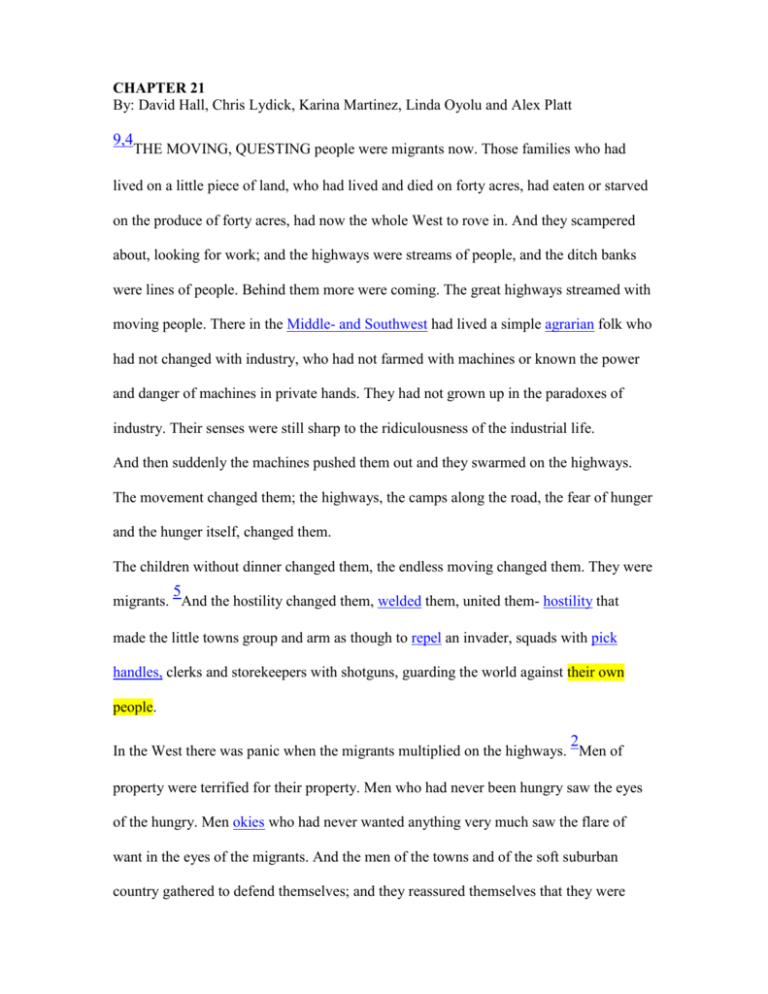
CHAPTER 21 By: David Hall, Chris Lydick, Karina Martinez, Linda Oyolu and Alex Platt 9,4 THE MOVING, QUESTING people were migrants now. Those families who had lived on a little piece of land, who had lived and died on forty acres, had eaten or starved on the produce of forty acres, had now the whole West to rove in. And they scampered about, looking for work; and the highways were streams of people, and the ditch banks were lines of people. Behind them more were coming. The great highways streamed with moving people. There in the Middle- and Southwest had lived a simple agrarian folk who had not changed with industry, who had not farmed with machines or known the power and danger of machines in private hands. They had not grown up in the paradoxes of industry. Their senses were still sharp to the ridiculousness of the industrial life. And then suddenly the machines pushed them out and they swarmed on the highways. The movement changed them; the highways, the camps along the road, the fear of hunger and the hunger itself, changed them. The children without dinner changed them, the endless moving changed them. They were 5 migrants. And the hostility changed them, welded them, united them- hostility that made the little towns group and arm as though to repel an invader, squads with pick handles, clerks and storekeepers with shotguns, guarding the world against their own people. 2 In the West there was panic when the migrants multiplied on the highways. Men of property were terrified for their property. Men who had never been hungry saw the eyes of the hungry. Men okies who had never wanted anything very much saw the flare of want in the eyes of the migrants. And the men of the towns and of the soft suburban country gathered to defend themselves; and they reassured themselves that they were Page 214 , Grapes of Wrath, The - John Steinbeck good and the invaders bad, as a man must do before he fights. They said, These 8 goddamned Okies are dirty and ignorant. They're degenerate, sexual maniacs. Those goddamned Okies are thieves. They'll steal anything. They've got no sense of property 3 rights. And the latter was true, for how can a man without property know the ache of ownership? 10 And the defending people said, They bring disease, they're filthy. We can't have them in the schools. They're strangers. How'd you like to have your sister go out with one of 'em? The local people whipped themselves into a mold of cruelty. Then they formed units, squads, and armed them- armed them with clubs, with gas, with guns. We own the country. We can't let these Okies get out of hand. And the men who were armed did not own the land, but they thought they did. And the clerks who drilled at night owned nothing, and the little storekeepers possessed only a drawerful of debts. But even a debt is 7 something, even a job is something. The clerk thought, I get fifteen dollars a week. S'pose a goddamn Okie would work for twelve? And the little storekeeper thought, How could I compete with a debtless man? And the migrants streamed in on the highways and their hunger was in their eyes, and their need was in their eyes. They had no argument, no system, nothing but their numbers and their needs. When there was work for a man, ten men fought for it- fought with a low wage. If that fella'll work for thirty cents, I'll work for twenty-five. If he'll take twenty-five, I'll do it for twenty. No, me, I'm hungry. I'll work for fifteen. I'll work for food. The kids. You ought to see them. Little boils, like, comin' out, an' they can't run aroun'. Give 'em some windfall fruit, an' they bloated up. Me, I'll work for a little piece of meat. 6 And this was good, for wages went down and prices stayed up. The great owners were glad and they sent out more handbills to bring more people in. And wages went down and prices stayed up. And pretty soon now we'll have serfs again. And now the great owners and the companies invented a new method. A great owner bought a cannery. And when the peaches and the pears were ripe he cut the price of fruit below the cost of raising it. And as cannery owner he paid himself a low price for the fruit and kept the price of canned goods up and took his profit. And the little farmers who owned no canneries lost their farms, and they were taken by the great owners, the banks, and the companies who also owned the canneries. As time went on, there were fewer farms. The little farmers moved into town for a while and exhausted their credit, exhausted their friends, their relatives. And then they too went on the highways. And the roads were crowded with men ravenous for work, murderous for work. And the companies, the banks worked at their own doom and they did not know it. The fields were fruitful, and starving men moved on the roads. 1 The granaries were full and the children of the poor grew up rachitic, and the pustules of pellagra swelled on their sides. The great companies did not know that the line between hunger and anger is a thin line. Page 215 , Grapes of Wrath, The - John Steinbeck And money that might have gone to wages went for gas, for guns, for agents and spies, for blacklists, for drilling. On the highways the people moved like ants and searched for work, for food. And the anger began to ferment. Pictures: Other links: 1. http://www.cliffsnotes.com/study_guide/literature/The-Grapes-of-Wrath-Summaryand-Analysis-Chapter-21.id-117,pageNum-72.html - This website provides literary analysis on chapter 21 especially on the “attack on commercial farming methods and their utter disregard for human decency.” 2. http://www.washingtonpost.com/wpdyn/content/article/2010/11/15/AR2010111506719.html -This is a link to the Washington Post article “17 million homes faced food shortage in 2009.” It is a modern issue relevant to the issues the Joads and migrant workers felt. 3. http://mockingbird.creighton.edu/english/fajardo/teaching/srp435/steinbeck3.htm -This link provides literary questions to allude to a larger theme and discusses “The Machine.” 4. http://www.loc.gov/rr/print/list/128_migm.html - This link is an article about Dorothea Lange's "Migrant Mother" a popular image from the Dust Bowl. Annotations: 1. “The granaries were full…And the anger began to ferment.” -The economic conditions have forced hoarding. Thus, even though there is food, the hoi polloi are still forced to be hungry and suffer from preventable diseases which are caused by inhumane conditions. Steinbeck includes the fact that there is a fine line between anger and hunger to show how the people are approaching anger. Thus, Steinbeck alludes to the fact that the anger people have will result in unforeseeable actions. 2. “Men of property were terrified for their property. Men who had never been hungry saw the eyes of the hungry. Men who had never wanted anything very much saw the flare of want in the eyes of the migrants. And the men of the towns and of the soft suburban country gathered to defend themselves; and they reassured themselves that they were good and the invaders bad.” -This shows the theme of people being afraid of things that are different from what they are familiar with. This is a natural reaction people have, and when your enemy is stronger or more than you, you must keep them separated and fighting themselves, so they do not focus on you. 3. “And the latter was true, for how can a man without property know the ache of ownership?” Humans cannot know what they haven't experienced. Humans cannot know what they haven't experienced, so you cannot judge them based on your experiences. 4. “The moving, questing people were migrants now…great highways streamed with moving people.” -Steinbeck uses ethical appeals which have strong diction to describe the harsh life the migrants are forced to endure. Using words like “lived and died” and “eaten or starved” and drifting the story from the focusing on the Joads, reinforcing the universal nature of the problems they face, reminding everyone that this could be them. 5. And the hostility changed them, welded them, united them- hostility that made the little towns group and arm as though to repel an invader, squads with pick handles, clerks and storekeepers with shotguns, guarding the world against their own people. - Polysyndeton is used here to emphasize each part. This stresses the fact that people were organizing themselves in order to prepare for a revolt and the community that Steinbeck wants to build begins to form. 6. “The great owners were glad and they sent out more handbills to bring more people in.” -The owners sent out more handbills than jobs available because they probably did not expect such large turnout. This shows that the situation everyone was in was distinct and unlike any other situation the people had seen. 7. “The clerk thought, I get fifteen dollars a week. S'pose a goddamn Okie would work for twelve? And the little storekeeper thought, How could I compete with a debtless man?” -By using "Okies" it implies that they are a completely separate group of people, obviously less important or greedy, working for less money than the clerk, 20% less, in fact. 8. "These goddamned Okies are dirty and ignorant. They're degenerate, sexual maniacs." -This quote is first of all calling the Okies by a name that implies they are a different group, separate from the rest. The different group is also insulted, to try and convince others of their disgusting characteristics and to show that these people are less than us. They can't compare to us. 9. “THE MOVING, QUESTING people were migrants now. Those families who had lived on a little piece of land, who had lived and died on forty acres, had eaten or starved on the produce of forty acres, had now the whole West to rove in” - The use of repetition not only stresses just how little the migrants really had, but it also shows to the reader that material possessions are taken for granted, this is an emotional appeal with a logical structure. 10. “And the defending people said, They bring disease, they're filthy. We can't have them in the schools. They're strangers. How'd you like to have your sister go out with one of 'em? The local people whipped themselves into a mold of cruelty. Then they formed units, squads, and armed them- armed them with clubs, with gas, with guns. We own the country. We can't let these Okies get out of hand. And the men who were armed did not own the land, but they thought they did. And the clerks who drilled at night owned nothing, and the little storekeepers possessed only a drawerful of debts. But even a debt is something, even a job is something” -Again the separation of the “Okies” as different, perhaps better, especially in saying “but even debt is something, even a job is something,” they have more even though they have next to nothing, the perspective of this is both an emotional appeal in that it evokes pity and compassion from the reader and it also is a logical appeal.
